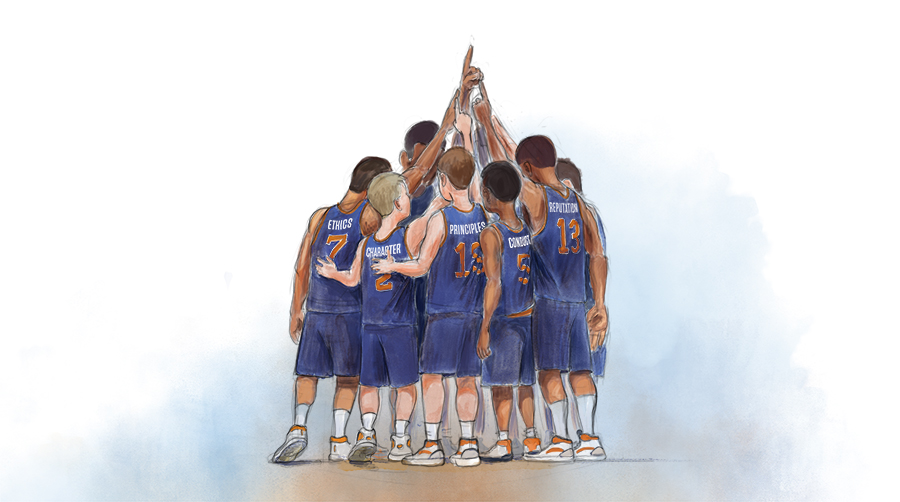Business Ethics is a Team Sport, says O.C. Ferrell, director of the Center for Ethical
Organizational Cultures in the Harbert College of Business.

Just as many business decisions are made by teams, so must the ethical conduct of business operations be viewed as a broader commitment that extends beyond the executive suite. It’s the kind of buy-in to a system that coaches seek in their athletic teams.
It’s not enough to simply draft an ethics policy, to file away some bundle of corporate paper that gets no consideration in the boardroom or in the workplace. Nor can executives assume that ethical conduct is no more than applied common sense everyone in the company will understand and follow.
Not unlike coaches of sports teams, effective business leaders must understand how to manage and motivate those who report to them, Ferrell says, and part of that challenge is a responsibility not only for their own ethical conduct, but also that of their subordinates. A code of ethics—in a sense, a playbook—that is clearly explained to employees and modeled by management is a critical element. Beyond the right-and-wrong aspects of an ethics code, it’s also a useful tool that can help identify areas of risk for a company by framing potential business issues.
Ferrell notes that understanding the sometimes subtle differences among terms often lumped together under the umbrella of ethics—or even used interchangeably—is important. The words matter. For example, values are “enduring beliefs and ideals,” and companies can choose them he says, citing Chick-fil-A’s decision not to operate its restaurants on Sundays.
Principles are “non-negotiable, fundamental” aspects of a company.
Social responsibility efforts and community contributions may have their own merits, but they don’t always equate to ethical corporate behavior. Consider the tale of Enron, for example, in which a company with a large and favorable outside-the-office presence was riddled with internal ethical deficiencies that eventually sank the company.
Morals are personal. “Companies don’t have a heart, a soul and a brain,” Ferrell says. “They’re a collection of people.”
Because different people may have different ethical senses, a corporate code of ethics is essential.
Ferrell likens business ethics to a three-legged stool that starts with the good personal character of those associated with the company. The executive or employee who lacks that is more likely to become a “rogue figure” whose actions can endanger the enterprise. The second leg is an ethics program that communicates shared values. The third leg is leadership that acts as role models for the kind of ethical conduct the company desires and recognizes its obligation to both expect and promote such conduct.
“The ethical leader knows when to intervene, how to coach, how to catch people early when they’re heading off the reservation,” Ferrell says. That’s not always easy; confronting ethics problems can require courage. “What if it’s your best friend or a close colleague?” he says, noting that conflicts of interest often lie at the heart of ethics problems.
Officials at two companies cited by Ferrell as having strong reputations for ethics, Hershey and the health care facilities operator Hospital Corporation of America, say that their ethical expectations are made clear to employees early on, then reinforced throughout their careers with the companies. “Individuals that join Hershey are informed of its ethical operating environment as part of the onboarding process,” says Sarah Foley, senior manager of global ethics compliance and legal operations. “They are required to complete an eLearning module on the company’s Code of Conduct, which sets forth the compliance expectations of Hershey and informs employees of resources should they have an ethical question or dilemma after joining.”
At HCA, “new employees receive Code of Conduct orientation within 30 days of hire and often within the first several days of their employment,” says Alan Yuspeh, senior vice president and chief ethics and compliance officer. “This training serves as an introduction not only to our Code of Conduct, but also to our mission and values and our commitments to stakeholders, which are foundational to our ethics and compliance efforts. We also have ethics and compliance officers at every facility who are trained and prepared to
address questions or issues employees might have.”
The companies’ codes of conduct also influence their business plans and employee evaluations.
“Hershey’s management team incorporates Hershey’s ethical expectations by reinforcing how important it is for us to watch over every business relationship, transaction and product, and guarantee that our actions always reflect our values,” Foley says. Executives “consistently reinforce” the principles of the code and “communicate that there are no exceptions” to following the code.
“HCA includes honoring our mission and values in its evaluation process,” Yuspeh says, adding that the company conducts periodic reviews to assess the effectiveness of its ethics program.
Both companies find that solid ethical policies and a commitment to implementing them result in a reputation that is good for the bottom line.

“Studies have shown that consumers want to purchase products and services from a company that operates with established ethical standards,” Foley says. “Maintaining high ethical standards builds trust with our consumers, which translates into success commercially.”
“We believe that when we put our patients first, then all else, including the financial well-being of the company, will follow,” Yuspeh says. “Likewise, we find ways to make good on our commitments to other stakeholders, most significantly our employees and affiliated physicians.”
It’s been a journey for HCA. In 1997, the company, then known as Columbia/HCA, pled guilty to 14 felonies and paid more than $1.7 billion in fines for fraud and falsifying Medicare bills. A focused effort to implement strong ethical practices resurrected the company’s reputation.
“That put them at a much higher ethical culture level than they were before the misconduct occurred,” Ferrell says. “Now, HCA is on the list of the most ethical companies in the world. The rest of the health care industry looks to
them as to how to develop a highly ethical company.”
Recognizing the importance of this element of business practice, Ferrell’s center is leading an effort to help students become ethical leaders. The center is developing multidisciplinary materials for Harbert faculty, and students can earn Ethical Leadership Certification, which Ferrell calls “a real credential” that is recognized and valued by potential employers.

